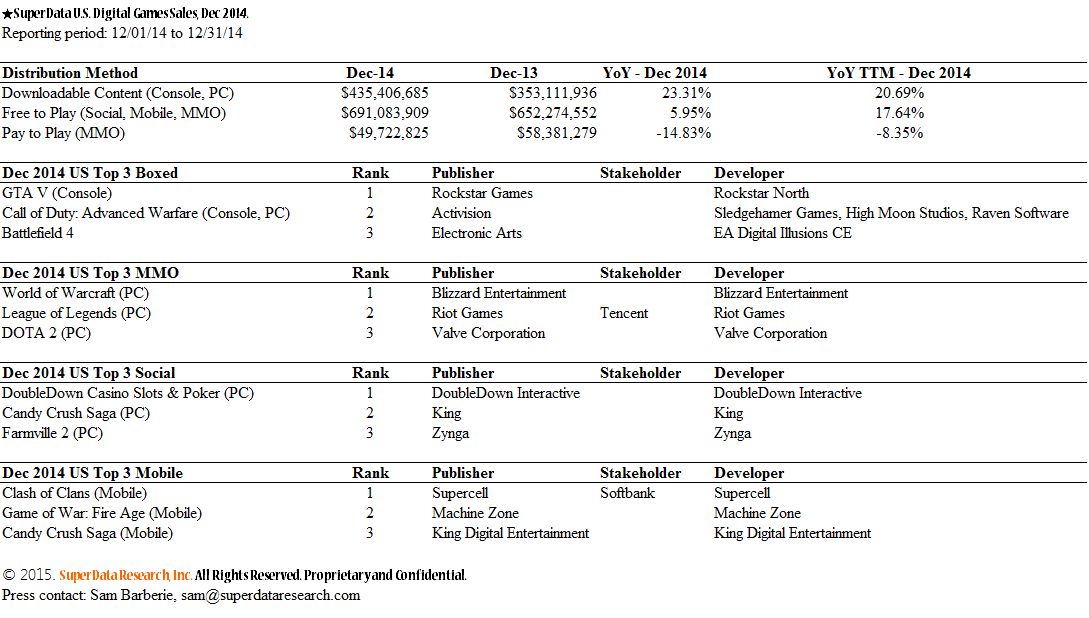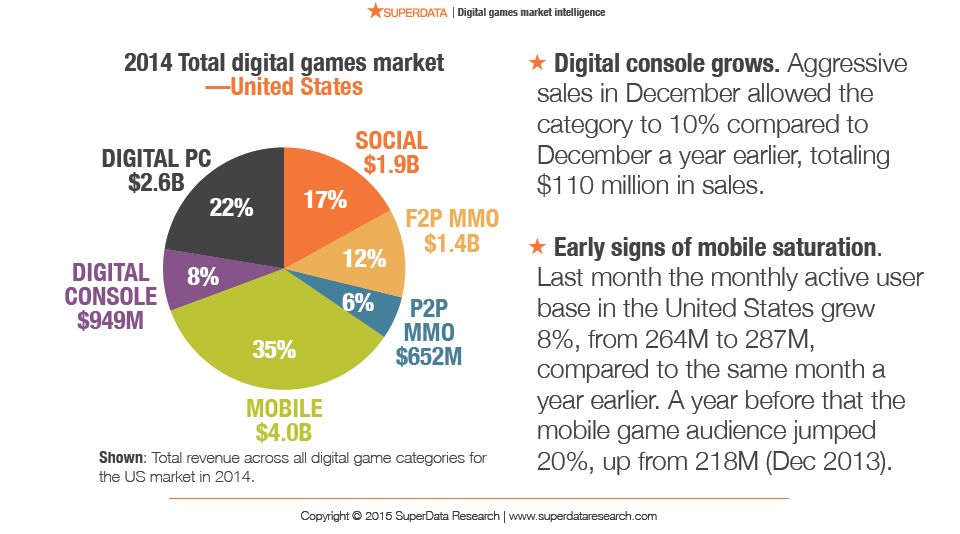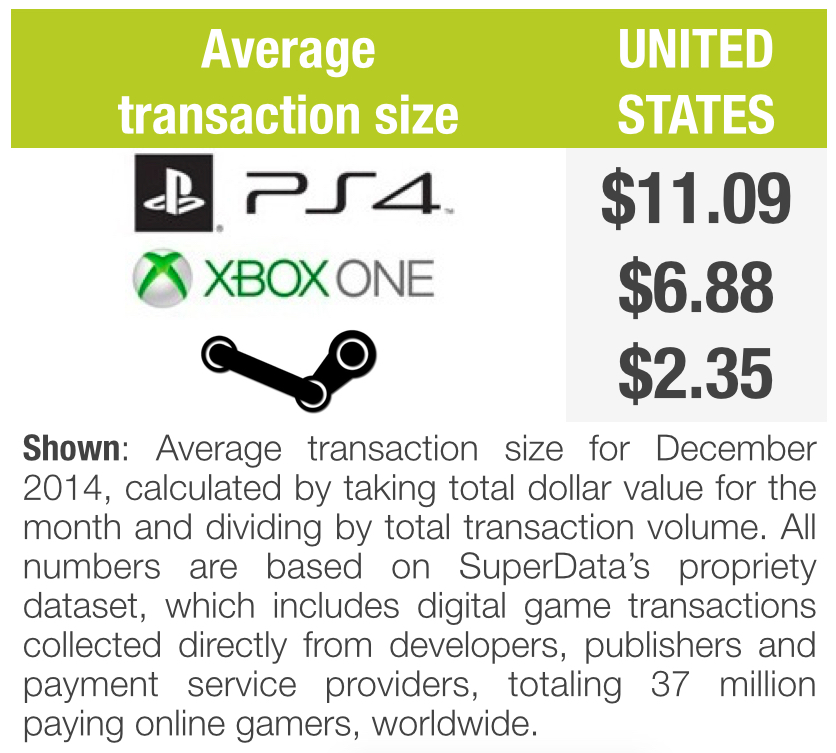Analysis from SuperData CEO, Joost van Dreunen, follows:
- Digital unit sales jump 10 percent on PS4 and Xbox One during holidays
- Increased spending offsets declining growth mobile games audience
- King recaptures players with Candy Crush Soda Saga
- 4K TVs at CES herald a new wave of smart devices
- Call of Duty Online launches Open Beta in China

Total spending on digital games in the US reached $1.2 billion in December, up 11 percent from the same month last year. Major drivers were mobile and digital console, which grew 17 percent and 10 percent in that same period, respectively. Among the digital platforms, mobile and digital console both follow the seasonal pattern of digital publishing most closely, with peak sales during the end of the year. Social gaming, on the other hand, is showing a 10 percent decline, totaling $184 million in sales compared to $204 million a year earlier.
Digital unit sales jump 10 percent on PS4 and XOne during holiday season
Aggressive sales of digital games on consoles allowed the category to grow 10 percent compared to December a year earlier. Totaling $110 million in sales, digital unit sales on both the PS4 and XOne jumped as the year came to a close. Compared to November, both platforms sold on average 12 times more units (full game downloads), but obviously did so at a lower than usual price-per-unit. The monthly average transaction value on PS4 dropped from $20 to $11, and from $21 to $7 on the XOne. By comparison, the average transaction value on Steam dropped to $2, down from $8 in November, as a result of this year’s Winter Sale.

Increased spending offsets declining growth in mobile games audience
If you asked Santa, he’d say the mobile games market had been both naughty and nice to publishers this season. During the holidays the overall user base for mobile gaming tends to grow in absolute numbers, but has now started to show early signs of saturation. In December 2014 the monthly active user base in the United States grew 8 percent, from 264 million to 287 million, compared to the same month a year earlier. A year before that the mobile game audience jumped 20 percent, up from 218 million in December 2013. The inevitable decline in growth as market penetration for tablets and smartphones climbs forces a shift in strategy among publishers. The goods news is that mobile game spending hit a new record with the average monthly spend across the entire mobile gaming audience reaching $1.41 in December.
King recaptures players with Candy Crush Soda Saga
Since its November launch, which included larger than life installations in London and New York City, King saw Candy Crush Soda Saga, the sequel to its earlier hit, quickly climbing the charts. Today, the title continues to be one of the top five grossing mobile games on Android and iOS and is the second most downloaded game on both app markets. King’s timing could not be more perfect, as its original breakout title Candy Crush Saga has started to lose steam. King currently claims three of the top five grossing apps on mobile and three of the most popular games on Facebook. The company’s success underscores a growing trend among publishers, like SuperCell, that currently dominate the ranks by financing large marketing campaigns, mostly via traditional channels such billboards and television.
4K TVs at CES herald a new wave of smart devices and a new platform for digital games
After a lukewarm reception in 2012 and 2013, Smart TVs are set for a comeback with the Trojan horse we have come to know as the 4K TV. The technology will be built into virtually every new Ultra HD screen and the devices will offer a number of games and apps. Leading the charge is Sony, who is equipping every new Bravia model with Android TV, Google’s new platform for television streaming. The Japanese giant is also teaming up with Samsung to to incorporate PlayStation Now, the console’s game streaming service, into all of Samsung’s Internet connected TVs in the US and Canada. Users with a paid subscription will be able to stream over 200 PlayStation 3 games by simply connecting Sony’s Dualshock controller. Additionally, both Samsung and Yahoo 4K TVs will include Playsino’s Home Bingo, which illustrates the number of possible Android-based apps that could soon enter the living room.
Call of Duty Online now in Open Beta in China
After a year of testing in Closed Beta, Activision recently launched the Open Beta for its highly anticipated free-to-play PC shooter together with Tencent. In offering one of its key franchises for free, using a free-to-play monetization scheme, the Western power house aims to gain a foothold in the desirable but tricky Chinese game market. The move follows a larger industry trend as also mobile game companies and console manufacturers have recently made inroads into China. Activision’s ambitious project, which included a promotional trailer with actor Chris Evans (AKA Captain America), hopes to rival popular Asian titles like Crossfire, which grossed $1.15 billion in 2014. Developed by Raven Software and Activision Shanghai, Call of Duty Online is specifically tailored to the Chinese market and includes unique microtransactions like renting in-game items. The content itself, a collage of the best elements from Black Ops and Modern Warfare, has also been carefully localized, swapping Zombies for more culturally relevant Cyborgs. If successful, the developer will likely adopt the strategy to enter other markets like Brazil, where consoles have been difficult to promote.

[a]listdaily Analysis
by Steve Peterson
The growth of digital game sales, and its ongoing transformation of all aspects of the game industry, continues, with December 2014 marking a milestone. “Looks like the difference between digital and retail is now no more than a rounding error,” said SuperData CEO Joost Van Dreunen in an email. Given the current trends, it certainly looks like digital’s share of the market will continue to grow. Mobile continued its upward trajectory with 17 percent growth, and interestingly console games showed 10 percent growth in digital sales on PS4 and Xbox One.
The interesting subtext here is that full game downloads on consoles have some definite downsides from a consumer standpoint. For one (important) thing, you can’t resell the game once you’re done with it, which is an important way for many game players to get some money to offset the cost of the next game they want to buy. You can’t exactly lend the game to a friend, though services like Sony’s Share Play feature address that to some extent. Plus, games to quite some time to download for most people, and the basic hard drives provided on the Xbox One and PS4 might be maxing out, especially with DLC and the various free games being provided on a monthly basis by both services.
On the other hand, digital full game downloads offer a major cost savings to publishers (no cost of goods, near-zero fulfillment costs) that can be a serious boost to the bottom line. The corollary, though, is that it’s very easy (all too easy, in the eyes of some) to discount game prices. In fact, we saw this very effect, as van Dreunen noted above: “The monthly average transaction value on PS4 dropped from $20 to $11, and from $21 to $7 on the XOne. By comparison, the average transaction value on Steam dropped to $2, down from $8 in November, as a result of this year’s Winter Sale.”
Now, many of those transactions were doubtless for DLC or lower-priced indie games, but it’s also true that a number of full games were on sale for the holidays. And why not, if it doesn’t seem to affect retail sales directly, and it adds to a publisher’s profits The long-term danger is that consumers will being to feel that games aren’t really worth $60 – which is already happening. Steam has trained many gamers that, if you’re not simply dying to play that hot new PC game right as it comes out, you can get it for far cheaper if you’re willing to wait for a sale. It shouldn’t be a surprise that we’ll see similar behavior with console games as consumers grow more used to downloading full game titles.
The natural response by publishers will be to try and boost the pre-orders by offering more perks, thus leading to more full-price sales (whether digital or physical). However, the track record of 2014, with so many AAA games that had problems, may be making consumers wary about signing up for pre-orders in 2015. That remains to be seen, but you can expect publishers will be working hard to overcome any such resistance.
Another notable data point from December is the success of King Digital’s sequel to Candy Crush Saga, Candy Crush Soda Saga. It’s unusual to see a mobile game sequel doing as well or better than its predecessor, which is a distinct change from the PC and console game market. Of course, most mobile games are continually improved and expanded over time, often on a weekly basis, so making comparisons to PC and console games is inexact. Still, it’s a solid boost for King Digital, wich needed that as the original Candy Crush Saga game has been fading. Now the question becomes will King Digital be able to find a completely different game that can be a hit on the same scale, or is it possible the company can figure out how to make lightning strike for a third time in pretty much the same spot
SuperData’s analysis of the 4K/UHD invasion of CES is spot on. While the higher definition will take time for full adoption, the sneaky part is that pretty much every TV from a major brand these days is a smart TV, 4K/UHD or not. Now these smart TVs are beginning to include games, game services, and full-on Android TV so that games and other apps can be downloaded right into the TV (if there’s space available, of course). It’s the console-less console, even to the point of offering PlayStation games through PlayStation Now, through both Sony and Samsung TVs (and perhaps other brands in the future). Gaming has broadened its audience tremendously through the ubiquity of mobile devices that can play decent games, and now TV screens are joining in on the fun.
It’s going to be an exciting year for digital game sales on all platforms, and about the only thing you can be sure of in 2015 is that we’ll see some surprises along the way.

